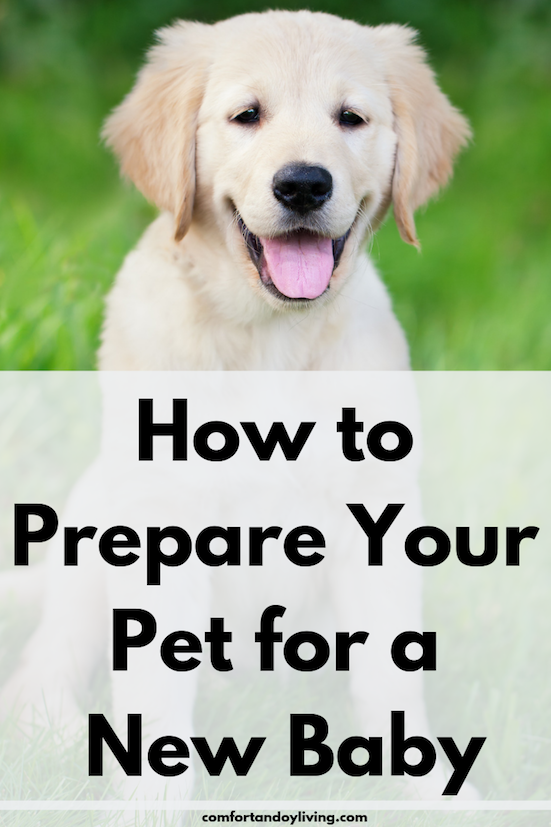Monthly and Weekend Events for Kids and Families:
Atlanta Boston Chicago Houston Los Angeles
New York City Philadelphia San Francisco Washington DC
HOME RECIPES DIY HOME KIDS CRAFTS
PARENTING WORK AT HOME JOB BOARD
How to Prepare Your Pet for a New Baby
We’ve always had pets in our family, even when we brought home our first baby. We’ve seen the way both our human and fur babies have interacted with each other and I have noticed that pets can soothe and offer companionship to a child that adults and siblings can’t, but keep in mind that some need extra training, guidance and supervision when they're around babies and young children.
Bringing home a baby means many changes for your family, including pets. Here are some ways to prepare your pet before bringing your new baby home.
If you have a dog
How well will your dog get along with your baby? The best type of dog to have around your baby is one that’s submissive and will tolerate a lot of handling. You should be able to roll him over, play with his paws, tug his ears stick your fingers in his mouth and do other thing a toddler would do without your dog reacting negatively.
If your dog knows that you’re the leader of the pack, it’ll usually follow your lead on how to treat the baby. Dogs are social animals and operate naturally in a family group, so most dogs adapt to a new baby pretty well. You may even find that when you take the dog and baby on a walk, the dog will act protective of the stroller. However, even if your dog doesn’t seem jealous of the baby, he may get frustrated he’s getting less exercise and social time. This can lead to negative behavior, like chewing on something of yours or jumping on you.
Here are some ways to manage your dog after you bring your baby home.
Set up a special area or room
You can use pet gates to confine your dog to a spare room or special area if he’s having trouble adjusting to our new baby.
Delegate responsibilities
If you’re dog’s main caregiver, give more walking, feeding and playing responsibilities to your spouse, so the dog doesn’t feel abandoned when the baby arrives.
Introduce new odors and sounds
The smell of a new baby can seem strange to a dog and the baby crying and screaming can be upsetting. Your dog may react by urinating in your home to mark his territory. Introduce the dog to a soiled baby’s diaper and a blanket before or as soon as you bring the baby home.
Stop your dog from jumping
If your dog is excitable and has a tendency to jump up, try to break him of this habit as soon as possible. You don’t want dog’s dirty paws coming at you while you’re carrying the baby. If you have a c-section, if your dog leaps at your incision, there’s a chance that he may tear it. Place a harness on your dog and train him when he jumps up by pulling him down with firm “no”. You can also get him obedience training.
Daily exercise
Don’t forget your dog’s daily exercise needs. Taking him on regular walks will help to calm his excitement. If you’re too tired from post birth recovery, or to busy with the baby, delegate this responsibility or hire a dog walker.
Retrain your dog
If your dog associates you being on the floor with playtime, retrain him to follow commands like “down” and “stay” when you’re in that position.
Spray or neuter
Neutered animals are generally calm and are less likely to be territorial and bite.
Practice with baby equipment
Some dogs may have problems walking alongside a stroller and others may become unnerved by the tick-tocking and motion of a baby swing and may attack it. Expose your dog to baby equipment and train him to remain calm around them.
If you have a cat
Cats and babies don’t always mix well. Some cats are mellow, but others can be unpredictable and get indignant when you don’t pet them in the right place or are high energy and will lash out and swipe at whatever catches their eye. While some cats can easily adapt readily to changes in your household, others may show their indignation by urinating on the rug if they feel they’re not getting the attention they deserve.
Keep your cat out of trouble
Keep the cat and baby separate. It’s best to keep the baby and cats away from each other unless you’re close enough to stop flying claws. Be particularly cautious when your child starts to become more mobile.
Spritz your cat
Use a spray bottle filled with water to train your cat to stay out of the baby’s room. Cats hate aluminum foil and cardboard covered with double-stick tape. Consider placing these in front of the baby’s room.
Tent the crib
For extra security, use a crib tent to keep your cat out of the baby’s sleep area.
Protect the cat’s territory
Make sure to keep the baby away from where the cat food is and of course, the litter box.
Provide a retreat for your cat
Create a secure place that your cat can retreat to from your baby, such as a tall scratching post or a perch so she can escape and safely watch from a distance.
What tips do you have for preparing your pets for a new baby?
Hello, I’m Kelly, a regular contributor on this blog. I live in Pennsylvania with my loving husband and our five beautiful children. I have a background in early childhood education, but I am currently homeschooling my kids. From pregnancy to postpartum to toddler life, I love sharing advice with other moms who are having a challenging time with this crazy but wonderful role of motherhood.
LEAVE A REPLY
Your email address will not be published.
